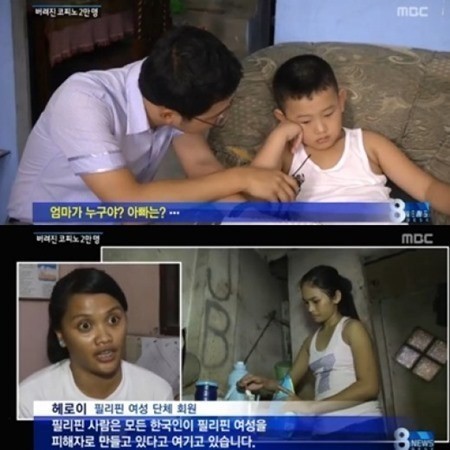코피노 아빠찾기 첫 소송이 승리하면서 줄소송이 이어질 것으로 보인다.서울가정법원 가사2단독 권양희 판사는 필리핀에 사는 A군과 B군이 한국에 사는 C씨를 상대로 낸 소송에서 “A군과 B군은 C씨의 친생자임을 인지한다”고 판결했다.
이로서 한국인 아버지와 필리핀인 어머니 사이에서 태어났으나 아버지로부터 버림받아 필리핀 현지에서 어렵게 살아온 이른바 ‘코피노’가 국내 법원에서 친부와의 혈연관계를 확인 받았다.
또, 그동안 시민단체 등에서 코피노의 친부를 찾아준 사례는 일부 있었지만, 코피노가 직접 친자확인소송을 제기해서 이긴 것은 이번이 처음이다.코피노 아빠찾기 소송은 앞서 사업가 A씨가 한국에서 결혼해 자녀들을 낳았으나 혼자 필리핀으로 건너가 회사를 운영하다가 현지 여성 B씨를 만나 동거 뒤 아이 두 명을 낳으면서 시작됐다.
 |
MBC 캡쳐 |
<관련 영문 뉴스>
Korean-Filipino children win paternity suit against Korean father
A Seoul court ruled in favor of two boys raised by their Filipino mother in a paternity suit against their Korean father, court officials said Sunday.
The verdict marks the first time a Filipino has won a paternity suit in a local court, suggesting that thousands of others like them might be able to file paternity litigations against Korean fathers.
The Seoul Family Court ruled that the Korean man was the “biological father of the children” after looking at related DNA test results and Filipino birth certificates. The Korean father could be forced to provide financial support for the two children if the ruling holds in higher courts.
The father already had a family in Korea when he went to the Philippines sometime in the early 2000s to run a local business. He fathered two children with the litigant before going back to Korea in 2004, according to court documents. He promised to return to the Philippines, but his Filipino partner and their two sons lost contact with the man.
The mother came to Korea in order to find the father, but all she had was only a picture and a name. With the help of the Support Center for Women’s Hotline, and Tacteen, a local support group for foreign women, the Filipino mother was able to file a suit in 2012.
The Filipino woman faced a slew of hurdles in the ensuing 18-month court battle. The father refused to undergo DNA tests for fear of losing his family in Korea, until a court order went through.
Financing her fight was also a problem until a lawyer agreed to work pro bono. The Korean government also agreed to provide more than 10 million won ($9,800) in court fees according to related laws.
“The mother did not file this lawsuit for financial reasons only,” Cho Dong-shik, the litigant’s attorney, said. “She did so to bring her children to Korea.” Studies estimate that more than 10,000 children have Korean fathers and Filipino mothers. Many of them barely know their fathers, who often leave their children without sharing the financial and emotional responsibilities of child rearing.
“The fundamental solution to this problem is a change in South Korean men’s general awareness,” Lee Hyun-sook, Tacteen’s chief, told local media.
By Jeong Hunny (hj257@heraldcorp.com)



![[Herald Interview] 'Trump will use tariffs as first line of defense for American manufacturing'](http://res.heraldm.com/phpwas/restmb_idxmake.php?idx=644&simg=/content/image/2024/11/26/20241126050017_0.jpg)


![[Health and care] Getting cancer young: Why cancer isn’t just an older person’s battle](http://res.heraldm.com/phpwas/restmb_idxmake.php?idx=644&simg=/content/image/2024/11/26/20241126050043_0.jpg)
